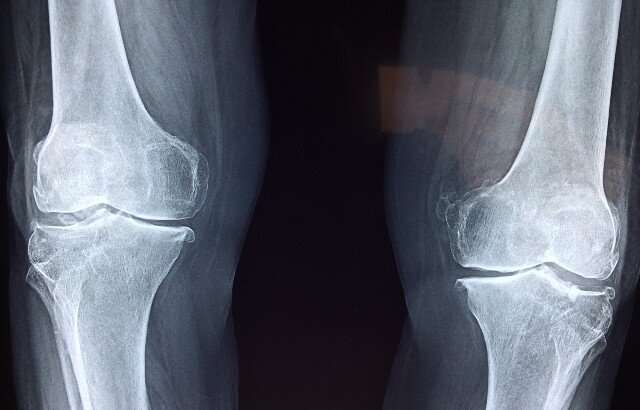New molecule repairs cartilage and relieves symptoms of osteoarthritis

A newly discovered molecule has been found to provide long-lasting regeneration of bone and cartilage defects, as well as symptom relief, and could potentially play a role in treating osteoarthritis, according to early research in animals led by Queen Mary University of London.
Cartilage overlies bones to enable frictionless movement in the joints. Although bone heals well, cartilage often fails to repair after injury. This leads to further cartilage loss and osteoarthritis, the most common cause of disability for which there is no cure, costing around 1.5 to 2 percent of GDP for westernized countries. Cartilage regeneration is therefore a priority in medicine.
In the research, published in the journal Science Translational Medicine, the team studied a molecule called "agrin" and discovered that it repairs cartilage by recruiting and activating adult stem cells present in the joint.
These mechanisms are the same as the ones the body uses when it is first developing the skeleton in the embryo. This study shows that supporting these mechanisms is an effective way to support the healing of lesions which are too big to heal in normal conditions.
In experiments in mice, a gel containing agrin was injected into joint surface defects, and after eight weeks, found to induce long-lasting regeneration of bone and cartilage, more so than in a control group that received the gel, but without agrin.
Cartilage and bone repair was also better after six months in sheep that had received the agrin-containing gel, compared to a control group. These sheep also spent more time playing and less time resting throughout the study, suggesting that the improved repair was associated with improved function.
Dr. Suzanne Eldridge from Queen Mary University of London said: "Osteoarthritis costs the UK £13 billion a year when including indirect costs, such as being out of work or the cost of carers. It leaves people severely disabled and there is no cure. Many are unable to do basic things, including bathing, getting dressed, cooking or shopping. We all know how lockdown has affected us over the last few months—but these people live in a permanent type of lockdown. If we could intervene at an early stage once an injury has occurred, and repair the damage, the likelihood of patients going on to develop osteoarthritis is much slimmer. Our ultimate aim is to transform osteoarthritis from a disease that requires surgery, to one that just requires an injection."
Professor Francesco Dell'Accio from Queen Mary University of London added: "We've shown that it's possible to repair joint defects, for the moment at least in animals, not just in the bone but also in the cartilage. One single administration of this molecule is sufficient to trigger a cascade of events in the joints, which, once started, are then self-maintained. Not only does it achieve structural repair, but we've shown that it gives symptomatic relief in animals extremely rapidly."
The capacity of agrin to induce long-term cartilage regeneration after a single administration makes it an excellent candidate for clinical use, however, the molecule has not yet been tested as a therapy in humans.
The researchers are currently working towards developing a preparation of a quality suitable for human use so that, after further experiments in animals to exclude toxicity, they can plan the first study in humans. The team predict that they are several years away from being able to begin clinical trials in humans.
Head of research delivery at Versus Arthritis, Caroline Aylott, said: "Almost 9 million people have osteoarthritis in the UK, and the pain they experience can have a huge impact on their physical, emotional and social well-being. For many there are no treatments to slow down or stop this condition, and too many end up needing joint replacement surgery. Although at an early stage, these findings advance how we know cartilage may be repaired, and may help to develop more effective treatments for people with the condition."
More information: Suzanne E. Eldridge et al. Agrin induces long-term osteochondral regeneration by supporting repair morphogenesis, Science Translational Medicine (2020). DOI: 10.1126/scitranslmed.aax9086



















